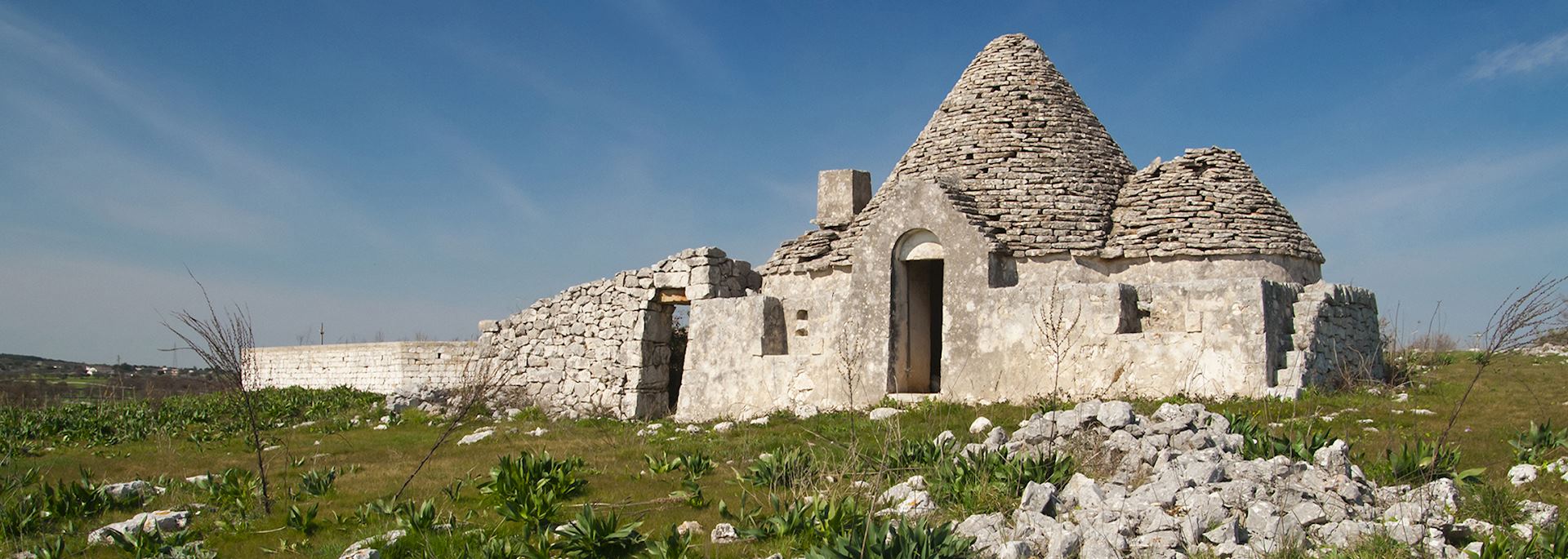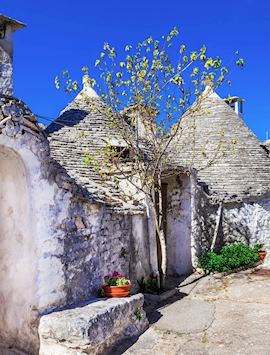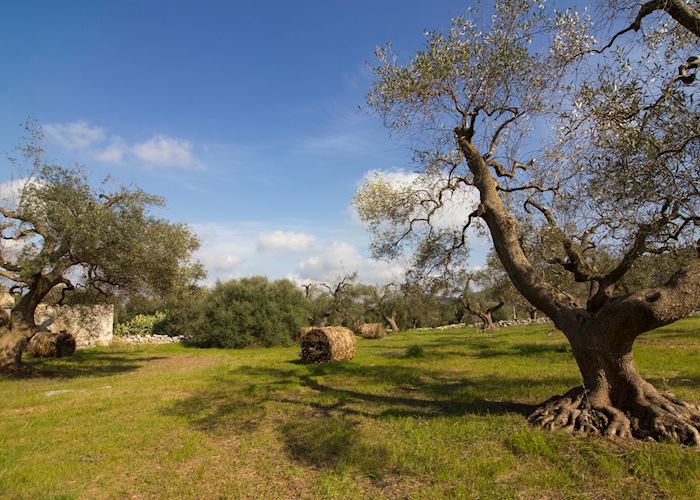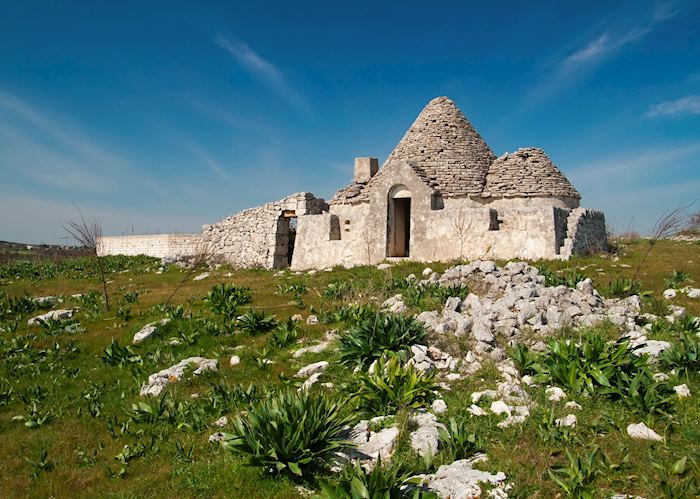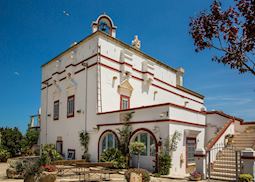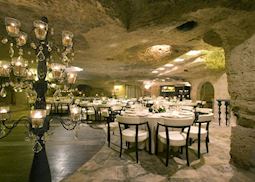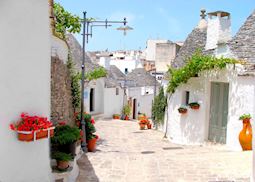Jump to:
Set where Puglia's low hills reach down to the Adriatic on the heel of Italy, Fasano is a small town with a historic core. A maze of narrow lanes, cobbled streets, archways, stairways and little piazzas make up the old town, which is set against a backdrop of rich Mediterranean vegetation.
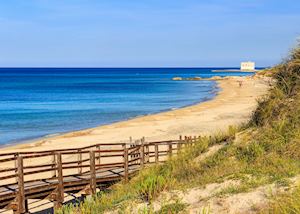 The hills are clad with olive groves and the nearby coast is fringed with soft, golden beaches and little coves. Although modern Fasano has less character than some of Puglia's other towns, the area is home to many of the region's top hotels and makes a tranquil base for exploring. Ostuni, a handsome hilltop village with narrow winding streets, and Alberobello, which is renowned for its conical limestone houses known as trulli, are nearby and make easy day trips.
The hills are clad with olive groves and the nearby coast is fringed with soft, golden beaches and little coves. Although modern Fasano has less character than some of Puglia's other towns, the area is home to many of the region's top hotels and makes a tranquil base for exploring. Ostuni, a handsome hilltop village with narrow winding streets, and Alberobello, which is renowned for its conical limestone houses known as trulli, are nearby and make easy day trips.
There has been a settlement in the Fasano area since Greco-Roman times, but the town increased in size in the 11th century when inhabitants of the nearby coastal city of Egnatia moved inland to avoid the constant wave of attacks. Pirates plagued the coast for centuries but were finally defeated in 1678. The victory was put down to the intercession of the Madonna and is celebrated in late June each year in a week-long festival with parades, costumes, concerts and a grand re-enactment of the battle.
Processions make their way through the city's narrow streets, where marble stairways lead to quiet corners. The palazzo used by the Knights of Malta is now the town hall, and a Baroque Arco dei Cavalieri (Arch of the Knights) commemorates their influence.
Early Christian churches, Baroque chapels and grand palazzi line the streets. The Via Appia (Appian Way), the ancient Roman road that linked southern Italy to Rome, runs along the coast and you can still see it today. There’s also a small port whose low-key promenade has a cluster of seafood restaurants.
At the nearby archaeological Park of Egnazia you can see the ruins of an ancient town Egnazia. The area was first settled in the Bronze Age, became an important trading hub in Roman times and then the early bishopric of Egnazia Appúla.
The city was eventually abandoned in the Middle Ages and much of its stone reused as building materials, but the extent of the ruins give a good impression of the city’s earlier importance. Around the town, the low hills are blanketed in olive groves. In their midst is the Museum of Olive Oil, set in a 12th-century masseria (fortified farmhouse) that was a former Benedictine monastery.
Best time to visit Fasano
April to June and September to November are excellent times to visit Fasano if you plan to explore the surrounding area rather than simply sit on the beach. The weather is warm and dry and the town is lively without being crowded. July and August are busier and temperatures rise to 94°F (34°C). Come in late June to see the annual La Scamiciata festivities.
who's been there
-
617-223-4521617-223-4395
- Make an inquiry
Suggested itinerary featuring Fasano
This sample itinerary will give you an idea of what is possible when you travel in Fasano, and showcases routes we know work particularly well. Treat this as inspiration, because your trip will be created uniquely by one of our specialists.
Places near Fasano
- Alberobello 8 miles away
- Ostuni 14 miles away
- Puglia 14 miles away
- Matera 42 miles away
- Lecce 55 miles away
- Otranto 77 miles away
- The Amalfi Coast 146 miles away
- Pompeii 150 miles away
- Sorrento 158 miles away
- Herculaneum 158 miles away
- Naples 163 miles away
- Capri 166 miles away
- Ischia 179 miles away
- Taormina 235 miles away
- Mount Etna 249 miles away
- Rome 264 miles away
- Sicily 269 miles away
- Syracuse 283 miles away
- Palermo 285 miles away
- Assisi 289 miles away
- Umbria 290 miles away
- Villa Romana del Casale 290 miles away
- Perugia 300 miles away
Photos of Fasano
Accommodation choices for Fasano
We've selected a range of accommodation options for when you visit Fasano. Our choices usually come recommended for their character, facilities and service or location. Our specialists always aim to suggest properties that match your preferences.
-
![Masseria San Domenico]()
Masseria San Domenico
Fasano -
![Masseria Salamina]() Responsible ChoiceWe've hand-selected a range of tours and stays across the world that go above and beyond to be a force for good by supporting local businesses, educating staff, challenging local norms, or promoting conservation and biodiversity efforts. Your Responsible Choice helps increase the positive impact of your trip.
Responsible ChoiceWe've hand-selected a range of tours and stays across the world that go above and beyond to be a force for good by supporting local businesses, educating staff, challenging local norms, or promoting conservation and biodiversity efforts. Your Responsible Choice helps increase the positive impact of your trip.Masseria Salamina
Fasano -
![Masseria Torre Maizza, Fasano]()
Masseria Torre Maizza
Fasano -
![Borgo Egnazia, Fasano]()
Borgo Egnazia
Fasano -
![Masseria Montenapoleone, Fasano]() Responsible ChoiceWe've hand-selected a range of tours and stays across the world that go above and beyond to be a force for good by supporting local businesses, educating staff, challenging local norms, or promoting conservation and biodiversity efforts. Your Responsible Choice helps increase the positive impact of your trip.
Responsible ChoiceWe've hand-selected a range of tours and stays across the world that go above and beyond to be a force for good by supporting local businesses, educating staff, challenging local norms, or promoting conservation and biodiversity efforts. Your Responsible Choice helps increase the positive impact of your trip.Masseria Montenapoleone
Fasano -
![Masseria Torre Coccaro, Fasano]()
Masseria Torre Coccaro
Fasano
Ideas for experiencing Fasano
Our specialists seek out authentic ways to get to know the places that could feature in your trip. These activities reflect some of the experiences they've most enjoyed while visiting Fasano, and which use the best local guides.
-
Puglian villages tour (Alberobello, Cisternino and Martina Franca) ![Alberobello, Puglia]()
Puglian villages tour (Alberobello, Cisternino and Martina Franca)
Puglian villages tour (Alberobello, Cisternino and Martina Franca)
You can visit Puglia's most characterful villages on a full-day private guided tour of their historic streets, shady squares and medieval churches. See Alberobello's conical trulli, the whitewashed hilltop town of Cisternino, and the Baroque and Rococo buildings of Martina Franca.
View details
